Papers by David Faraci

Appendix G, “Protecting Access to Immune Globulins for Canadians.”, 2018
We have strong reservations regarding any Act or legislation (hereafter: “Acts”) that would prohi... more We have strong reservations regarding any Act or legislation (hereafter: “Acts”) that would prohibit compensation for blood plasma donations, where the donated plasma will be processed into PDMPs, like Ig. (We do not here address blood plasma collected for transfusions or other purposes.) Both the ethical and the economic arguments against a compensatory model for blood plasma for further manufacture into PDMPs (hereafter: “the compensatory model”) are weak. Moreover, significant ethical considerations speak in favour of the compensatory model, and therefore against the Acts.
We respond to the ethical arguments offered in favour of the Acts: that the compensatory model would result in wrongful exploitation; that the compensatory model would promote the view that human beings, their bodies, or subparts thereof, are mere commodities; and that the compensatory model would incentivize donation for personal gain over donation from altruistic motives. We agree with Health Canada, Canadian Blood Services, and all major medical oversight bodies that there are no safety issues associated with PDMPs, including Ig, made with paid donors. With regard to the security of Canada’s supply of PDMPs, including Ig, we note that it has been and currently is overwhelmingly dependent upon the compensatory model, and that this is likely to continue well into the future. Given this fact, we note that the goal of having a sufficient quantity of PDMPs, including Ig, is undermined by the Acts. Given the moral urgency of increasing the supply of PDMPs, including Ig, and the weakness of the economic and ethical arguments thus far presented against the compensatory model, we conclude that the Acts are not justified.

Philosophia, 2010
In "Vindicating the Normativity of Rationality," Nicholas Southwood proposes that rational requir... more In "Vindicating the Normativity of Rationality," Nicholas Southwood proposes that rational requirements are best understood as demands of one's "firstpersonal standpoint." Southwood argues that this view can "explain the normativity or reason-giving force" of rationality by showing that they "are the kinds of thing that are, by their very nature, normative." We argue that the proposal fails on three counts: First, we explain why demands of one's first-personal standpoint cannot be both reason-giving and resemble requirements of rationality. Second, the proposal runs headlong into the now familiar "bootstrapping" objection that helped illuminate the need to vindicate the normativity of rationality in the first place. Lastly, even if Southwood is right-the demands of rationality just are the demands or our first-personal standpoints-the explanation as to why our standpoints generate reasons will entail that we sometimes have no reason at all to be rational.
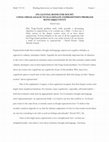
Oxford Studies in Metaethics (pending final review)
Expressivism holds that normative thought and language express non-cognitive attitudes. In print,... more Expressivism holds that normative thought and language express non-cognitive attitudes. In print, the central objection to the view has been the Frege-Geach problem: the charge that expressivist semantics cannot accommodate the fact that normative claims match ordinary descriptive ones in their logical behavior. Yet few cognitivists are cognitivists because of this problem, but because they have “deeper” worries about expressivism—worries they have spent comparatively little time pursuing in print. Part of the explanation for this, I suspect, is that cognitivists understand these deeper worries to be largely metaphysical. For example, many cognitivists doubt that expressivism can accommodate their sense that normative truth must be objective. Unfortunately, given that expressivism is not a metaphysical view—at least not straightforwardly—it can be hard to see how to make the charge stick. My goal in this paper is to make this charge stick by introducing claims about thought and language, rather than metaphysics, that represent common intuitions about objectivity. I argue that expressivists cannot accept the claims in question if they are to solve the Negation Problem—an aspect of Frege-Geach. If successful, this shows that expressivists really do have a problem accommodating normative objectivity. But, significantly, it does so without requiring any assumptions about what expressivist metaphysics look like (if there even is such a thing). As an added bonus, Frege-Geach turns out to represent some of cognitivists’ “deeper worries” after all.
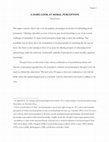
Philosophical Studies
This paper concerns what I take to be the primary epistemological motivation for defending moral ... more This paper concerns what I take to be the primary epistemological motivation for defending moral perception. Offering a plausible account of how we gain moral knowledge is one of the central challenges of metaethics. It seems moral perception might help us meet this challenge. The possibility that we know about the instantiation of moral properties in something like the way we know that there is a bus passing in front of us raises the alluring prospect of subsuming moral epistemology under the (relatively) comfortable umbrella of perceptual or, more broadly, empirical knowledge. The good news on this front is that various combinations of metaethical positions and theories of perception arguably have the potential to vindicate moral perception (though I won’t do much to defend this claim here). The bad news, I’ll argue, is that moral perception would be
dependent for its epistemic merit on background knowledge of bridge principles linking moral and non-moral properties. Thus, in order to defend a purely perceptual moral epistemology, one would have to argue that knowledge of those principles is likewise perceptual. I further argue it is not.
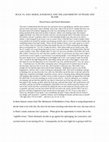
Oxford Studies in Experimental Philosophy
When Huckleberry Finn fails to turn in Jim, he believes he is going to hell for doing what he has... more When Huckleberry Finn fails to turn in Jim, he believes he is going to hell for doing what he has been raised to believe is wrong. When Susan Wolf’s JoJo—raised by his dictator father to embrace his father’s evil values—grows up, he tortures peasants on a whim. Are they morally
responsible? Many philosophers have simply assumed what our pretheoretic intuitions are in these cases, and their assumptions have prompted two thoughts: (a) childhood deprivations of moral knowledge excuse from responsibility, and (b) blameworthiness and praiseworthiness are symmetrical, so that whatever agential features excuse from one will excuse from the other. In this paper, we discuss tests we designed and had implemented to reveal what people’s pretheoretic intuitions actually are in such cases. Both theses are really more nuanced than they have been taken to be, and our unified explanation for the results reveals an underexplored feature of responsibility.
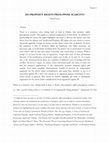
Journal of Business Ethics
There is a common view, dating back at least to Hume, that property rights presuppose scarcity. T... more There is a common view, dating back at least to Hume, that property rights presuppose scarcity. This paper is a critical examination of that thesis. In addition to questioning the thesis, the paper highlights the need to divorce the debate over this thesis from the debate over Intellectual Property (IP) rights (the area where it is most frequently applied). I begin by laying out the thesis’ major line of defense. In brief, the argument is that (1) property rights are legitimate only when necessary, (2) necessary only to avoid injury resulting from one party’s use or possession of a good over others’, and (3) that such injury is possible only where there is scarcity. While I accept (1) (at least for the sake of argument), I argue that each of three prominent theories of the justification of property rights cast doubt on (2) and (3). As it turns out, at the theoretical level, there are a number of different ways of dealing with this conflict. However, I argue, no matter which theoretical path one takes, it turns out that the practical implications of the relationship between property rights and scarcity have been woefully misconstrued. Finally, I recount an independent argument for the thesis under consideration and argue that, whether or not it is successful against IP, it does not extend as an argument against ownership of non-scarce goods in general. This serves to further highlight the need to distinguish arguments for the thesis under consideration from arguments against IP.
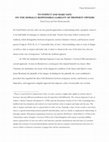
Ethical Theory and Moral Practice, 2014
There is currently a stalemate over the correct approach to legal liability. To take a prominent ... more There is currently a stalemate over the correct approach to legal liability. To take a prominent example, it remains a point of contention whether land owners should be held liable for injuries to
trespassers. Many of those who insist that land owners should be held liable for injuries to trespassers maintain this for purely economic or pragmatic reasons. In contrast, those on the other side frequently defend their view on the grounds that, in such trespass cases, owners are not morally responsible for the injuries. We maintain that the best way forward for all parties in this debate is to recognize the existence of “morally responsible liability”—of cases where owners qua owners are morally responsible for damages caused by their property. Once this is recognized, the debate can be framed in terms of whether there are economic or pragmatic reasons for legal liability to diverge from morally responsible liability. Unfortunately, there is no good account of morally responsible liability in the literature. Taking lessons from the failings of the few extant accounts, we draw on the work of A. M. Honoré and Jeremy Waldron to develop an account of our own. We argue that owners are morally responsible for damages caused by their property when and because their taking ownership of something leads to increased risk to others. We explain how and why such increases in risk come about, and how our account captures our intuitions concerning various cases, including those concerning injuries to trespassers.

Philosophia, 2013
In “The possibility of morality,” Phil Brown considers whether moral error theory is best underst... more In “The possibility of morality,” Phil Brown considers whether moral error theory is best understood as a necessary or contingent thesis. Among other things, Brown contends that the argument from relativity, offered by John Mackie—error theory’s progenitor—supports a stronger modal reading of error theory. His argument is as follows: Mackie’s is an abductive argument that error theory is the best explanation for divergence in moral practices. Since error theory will likewise be the best explanation for similar divergences in possible worlds similar to our own, we may conclude that error theory is true at all such worlds, just as it is in the actual world. I contend that Brown’s argument must fail, as abductive arguments cannot support the modal conclusions he suggests. I then consider why this is the case, concluding that Brown has stumbled upon new and interesting evidence that agglomerating one’s beliefs can be epistemically problematic—an issue associated most famously with Henry Kyburg’s lottery paradox.

Philosophia, 2010
In “Vindicating the Normativity of Rationality,” Nicholas Southwood proposes that rational requir... more In “Vindicating the Normativity of Rationality,” Nicholas Southwood proposes that rational requirements are best understood as demands of one’s “first-personal standpoint.” Southwood argues that this view can “explain the normativity or reason-giving force” of rationality by showing that they “are the kinds of thing that are, by their very nature, normative.” We argue that the proposal fails on three counts: First, we explain why demands of one’s first-personal standpoint cannot be both reason-giving and resemble requirements of rationality. Second, the proposal runs headlong into the now familiar “bootstrapping” objection that helped illuminate the need to vindicate the normativity of rationality in the first place. Lastly, even if Southwood is right—the demands of rationality just are the demands or our first-personal standpoints—the explanation as to why our standpoints generate reasons will entail that we sometimes have no reason at all to be rational.
Review of Philosophy and Psychology, 2010
Susan Wolf objects to the Real Self View (RSV) of moral responsibility that it is insufficient, t... more Susan Wolf objects to the Real Self View (RSV) of moral responsibility that it is insufficient, that even if one’s actions are expressions of one’s deepest or “real” self, one might still not be morally responsible for one’s actions. As a counterexample to the RSV, Wolf offers the case of JoJo, the son of a dictator, who endorses his father’s (evil) values, but who is insane and is thus not responsible for his actions. Wolf’s data for this conclusion derives from what she takes to be our “pretheoretic intuitions” about JoJo. As it turns out, though, experimental data on actual pretheoretic intuitions does not seem to support Wolf’s claim. In this paper, we present such data and argue that, at least with respect to this particular objection, the RSV can survive Wolf’s attack intact.
Book Reviews by David Faraci
Journal of Value Inquiry, 2012
Turn over a copy of David Enoch's Taking Morality Seriously: A Defense of Robust Realism, and you... more Turn over a copy of David Enoch's Taking Morality Seriously: A Defense of Robust Realism, and you will find the usual array of quotations extolling the book's virtues. The first is from Russ Shafer-Landau-arguably the philosopher most responsible for the current resurgence of Moorean-style non-naturalism-who writes that this "is the best book that has ever been written in defense of ethical realism." The last is from Hartry Field, who claims that "on the scale of texts arguing for an obviously false conclusion, this actually ranks pretty high!"
Drafts by David Faraci
A staggering amount of work in the philosophies of mathematics, logic, ethics and philosophy itse... more A staggering amount of work in the philosophies of mathematics, logic, ethics and philosophy itself concerns the so-called Benacerraf-Field Challenge and its relatives: Knowledge requires that our beliefs correspond to the truth. In the domains just mentioned, such correspondence can seem troublingly mysterious. It calls out for explanation; yet many think we have none to offer. If there is indeed no way to explain belief-truth correspondence in these domains, some claim this should undermine those beliefs. Yet despite its ubiquity, there is little agreement on what, if any, epistemological challenge reflects this intuitive gloss. In this paper, I explore the intuitive underpinnings of this challenge, and use them to defend it against an argument that it poses no threat in the domains in which it is typically raised.
Dissertation by David Faraci
Broadly and somewhat roughly speaking, metanormative theorists who maintain that there is normati... more Broadly and somewhat roughly speaking, metanormative theorists who maintain that there is normative truth fall into one of three camps: non-naturalist, naturalist and expressivist. I am interested in the prospects for normative truth, and thus in which, if any, of these positions offers hope for the discovery of such truth. In each of three chapters, I address one of these views. I conclude that our best hope is a view most closely related to naturalism (though I reject this classification for one that I believe better captures what is at stake in the literature I focus on).
Blogs by David Faraci









Uploads
Papers by David Faraci
We respond to the ethical arguments offered in favour of the Acts: that the compensatory model would result in wrongful exploitation; that the compensatory model would promote the view that human beings, their bodies, or subparts thereof, are mere commodities; and that the compensatory model would incentivize donation for personal gain over donation from altruistic motives. We agree with Health Canada, Canadian Blood Services, and all major medical oversight bodies that there are no safety issues associated with PDMPs, including Ig, made with paid donors. With regard to the security of Canada’s supply of PDMPs, including Ig, we note that it has been and currently is overwhelmingly dependent upon the compensatory model, and that this is likely to continue well into the future. Given this fact, we note that the goal of having a sufficient quantity of PDMPs, including Ig, is undermined by the Acts. Given the moral urgency of increasing the supply of PDMPs, including Ig, and the weakness of the economic and ethical arguments thus far presented against the compensatory model, we conclude that the Acts are not justified.
dependent for its epistemic merit on background knowledge of bridge principles linking moral and non-moral properties. Thus, in order to defend a purely perceptual moral epistemology, one would have to argue that knowledge of those principles is likewise perceptual. I further argue it is not.
responsible? Many philosophers have simply assumed what our pretheoretic intuitions are in these cases, and their assumptions have prompted two thoughts: (a) childhood deprivations of moral knowledge excuse from responsibility, and (b) blameworthiness and praiseworthiness are symmetrical, so that whatever agential features excuse from one will excuse from the other. In this paper, we discuss tests we designed and had implemented to reveal what people’s pretheoretic intuitions actually are in such cases. Both theses are really more nuanced than they have been taken to be, and our unified explanation for the results reveals an underexplored feature of responsibility.
trespassers. Many of those who insist that land owners should be held liable for injuries to trespassers maintain this for purely economic or pragmatic reasons. In contrast, those on the other side frequently defend their view on the grounds that, in such trespass cases, owners are not morally responsible for the injuries. We maintain that the best way forward for all parties in this debate is to recognize the existence of “morally responsible liability”—of cases where owners qua owners are morally responsible for damages caused by their property. Once this is recognized, the debate can be framed in terms of whether there are economic or pragmatic reasons for legal liability to diverge from morally responsible liability. Unfortunately, there is no good account of morally responsible liability in the literature. Taking lessons from the failings of the few extant accounts, we draw on the work of A. M. Honoré and Jeremy Waldron to develop an account of our own. We argue that owners are morally responsible for damages caused by their property when and because their taking ownership of something leads to increased risk to others. We explain how and why such increases in risk come about, and how our account captures our intuitions concerning various cases, including those concerning injuries to trespassers.
Book Reviews by David Faraci
Drafts by David Faraci
Dissertation by David Faraci
Blogs by David Faraci
We respond to the ethical arguments offered in favour of the Acts: that the compensatory model would result in wrongful exploitation; that the compensatory model would promote the view that human beings, their bodies, or subparts thereof, are mere commodities; and that the compensatory model would incentivize donation for personal gain over donation from altruistic motives. We agree with Health Canada, Canadian Blood Services, and all major medical oversight bodies that there are no safety issues associated with PDMPs, including Ig, made with paid donors. With regard to the security of Canada’s supply of PDMPs, including Ig, we note that it has been and currently is overwhelmingly dependent upon the compensatory model, and that this is likely to continue well into the future. Given this fact, we note that the goal of having a sufficient quantity of PDMPs, including Ig, is undermined by the Acts. Given the moral urgency of increasing the supply of PDMPs, including Ig, and the weakness of the economic and ethical arguments thus far presented against the compensatory model, we conclude that the Acts are not justified.
dependent for its epistemic merit on background knowledge of bridge principles linking moral and non-moral properties. Thus, in order to defend a purely perceptual moral epistemology, one would have to argue that knowledge of those principles is likewise perceptual. I further argue it is not.
responsible? Many philosophers have simply assumed what our pretheoretic intuitions are in these cases, and their assumptions have prompted two thoughts: (a) childhood deprivations of moral knowledge excuse from responsibility, and (b) blameworthiness and praiseworthiness are symmetrical, so that whatever agential features excuse from one will excuse from the other. In this paper, we discuss tests we designed and had implemented to reveal what people’s pretheoretic intuitions actually are in such cases. Both theses are really more nuanced than they have been taken to be, and our unified explanation for the results reveals an underexplored feature of responsibility.
trespassers. Many of those who insist that land owners should be held liable for injuries to trespassers maintain this for purely economic or pragmatic reasons. In contrast, those on the other side frequently defend their view on the grounds that, in such trespass cases, owners are not morally responsible for the injuries. We maintain that the best way forward for all parties in this debate is to recognize the existence of “morally responsible liability”—of cases where owners qua owners are morally responsible for damages caused by their property. Once this is recognized, the debate can be framed in terms of whether there are economic or pragmatic reasons for legal liability to diverge from morally responsible liability. Unfortunately, there is no good account of morally responsible liability in the literature. Taking lessons from the failings of the few extant accounts, we draw on the work of A. M. Honoré and Jeremy Waldron to develop an account of our own. We argue that owners are morally responsible for damages caused by their property when and because their taking ownership of something leads to increased risk to others. We explain how and why such increases in risk come about, and how our account captures our intuitions concerning various cases, including those concerning injuries to trespassers.